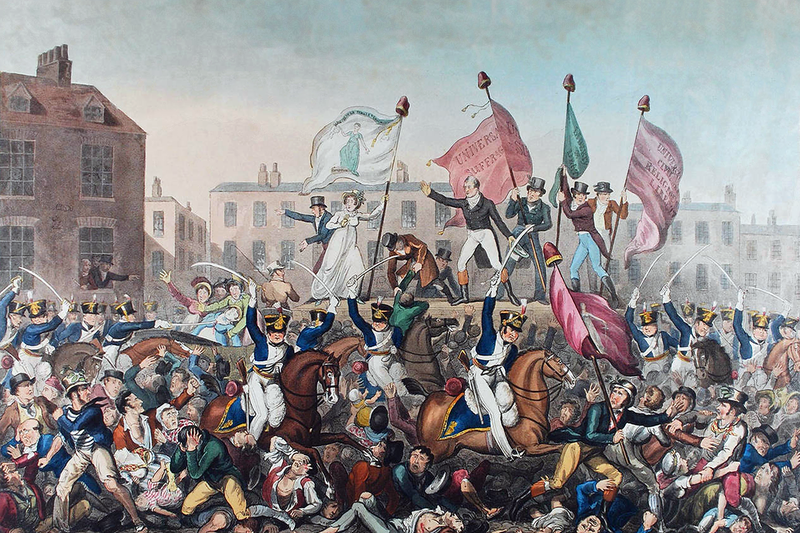Peterloo Massacre


The Peterloo Massacre took place at St Peter's Field, Manchester, Lancashire, England on Monday 16 August 1819. On this day, cavalry charged into a crowd of around 60,000 people who had gathered to demand the reform of parliamentary representation.
After the end of the Napoleonic Wars in 1815 there was an acute economic slump, accompanied by chronic unemployment and harvest failure, and exacerbated by the Corn Laws, which kept the price of bread high. At that time only around 11% of adult males had the vote, very few of them in the industrial north, which was worst hit. Reformers identified parliamentary reform as the solution and a mass campaign to petition parliament for manhood suffrage gained three-quarters of a million signatures in 1817 but was flatly rejected by the House of Commons. When a second slump occurred in early 1819, radical reformers sought to mobilise huge crowds to force the government to back down. The movement was particularly strong in the north-west of England, where the Manchester Patriotic Union organised a mass rally in August 1819, addressed by well-known radical orator Henry Hunt.
Shortly after the meeting began, local magistrates called on the Manchester and Salford Yeomanry to arrest Hunt and several others on the platform with him. The Yeomanry charged into the crowd, knocking down a woman and killing a child, and finally apprehended Hunt. Cheshire Magistrates' chairman William Hulton then summoned the 15th Hussars to disperse the crowd. They charged with sabres drawn, and between nine and fifteen people were killed and four to seven hundred injured in the ensuing confusion. The event was first labelled the "Peterloo massacre" by the radical Manchester Observer newspaper in a bitterly ironic reference to the bloody Battle of Waterloo which had taken place four years earlier.
Historian Robert Poole has called the Peterloo Massacre 'the bloodiest political event of the 19th century in English soil', and 'a political earthquake in the northern powerhouse of the industrial revolution'. The London and national papers shared the horror felt in the Manchester region, but Peterloo's immediate effect was to cause the government to pass the Six Acts, which were aimed at suppressing any meetings for the purpose of radical reform. It also led indirectly to the foundation of the Manchester Guardian newspaper. In a survey conducted by The Guardian in 2006, Peterloo came second to the Putney Debates as the event from radical British history that most deserved a proper monument or a memorial.
For some time, Peterloo was commemorated only by a blue plaque, criticised as being inadequate and referring only to the "dispersal by the military" of an assembly. In 2007, the City Council replaced the blue plaque with a red plaque with less euphemistic wording, explicitly referring to "a peaceful rally" being "attacked by armed cavalry" and mentioning "15 deaths and over 600 injuries". In 2019, on the 200th anniversary of the massacre, Manchester City Council inaugurated a new Peterloo Memorial by the artist Jeremy Deller, featuring eleven concentric circles of local stone engraved with the names of the dead and the places from which the victims came.












0 comments
Sign in or create a free account